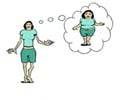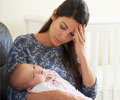After studying 51 teenagers with anorexia nervosa and an equal number of healthy persons for a number of years, a team of Swedish scientists have come to the conclusion that psychiatric
Adults who once had anorexia are more likely to have psychiatric disorders; reports a team of Swedish scientists after studying 51 teenagers with anorexia nervosa and an equal number of healthy persons for several years.
"This study is unique in an international perspective. It is the only study in the world that reflects the natural course of anorexia nervosa in the population," says Elisabet Wentz, Associate Professor in Child and Adolescent Psychiatry at the Sahlgrenska Academy.In a report based on the findings of the study, initiated in 1985, the researchers point out that the groups have been investigated and compared several times as the years have passed.
They say that three women have still not recovered from anorexia, 18 years after the start of the study.
According to them, 13 people, or around 25 per cent, are on disability benefit or have been signed off sick for more than six months due to an eating disorder or other psychiatric disorder.
The research team further say that 39 per cent of the subjects have at least one other psychiatric disorder, in addition to the eating disorder. The most common of these is obsessive compulsive disorder.
However, the study's findings also contain some positive surprises.
Advertisement
Studies conducted in the past have shown that infertility is a common complication for adult women who have had anorexia, as are increased risks of giving birth prematurely and of post-natal depression.
Advertisement
According to them, such kids had a lower birth weight than children of women in the control group.
"None of the women who had had children still suffered from an eating disorder, but it is still more common that they worry about whether their babies are putting on weight," says Elisabet Wentz.
The findings of the new study have been published in the British Journal of Psychiatry and in the International Journal of Eating Disorders.
Source-ANI
TAN/L















